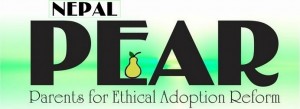
A group of Canadian couples hopes to convince the federal government to overturn a recommendation last month to suspend all adoptions from Nepal.
Ottawa resident Adrian Gollner and his wife are among 11 couples who had started the process of adopting children in Nepal in the hopes of bringing them to Canada in 2009.
But a February report from the Hague Conference on Private International Law raised concerns of fraudulent adoptions and child trafficking in Nepal. In response, federal agencies called on provinces to suspend adoptions from the South Asian country. The report followed visits from international monitors in the fall of 2009 that found widespread evidence of falsification of records.
That decision left Gollner’s family plans in limbo. He and his wife have a four-year-old biological son, but were hoping to add another child to the family and had tried adopting from China.
But faced with an eight-year wait to go through China’s adoption process, they decided to try Nepal, which in 2008 signed on to the Hague Convention, allowing for international adoptions to fellow convention signatories such as Canada.
Gollner said he and his wife had no intention of obtaining a child illegally, but they were hoping that there might a more nuanced solution than simply banning all adoptions from the country.
“There has been some corruption, but that doesn’t mean that there aren’t fully legitimate orphans there who need families and who are indeed very poor,” he said.
Issues involving international adoptions are complex, however, because while the provinces oversee the process, they often take their lead from several federal agencies. Other couples with Gollner’s group are from B.C., Alberta, Saskatchewan and Quebec.
It makes it difficult, said Gollner, to know which agency to deal with to get answers, he said.
Verify outstanding adoptions, father asks
Some of the families represented by immigration lawyer Sas had already been given information about the children they were set to adopt before delays and finally the suspension of the process happened. But Gollner said his family had not advanced that far in the process due to frequent delays.
He said he fears the suspension will become an outright ban, leaving his family with no recourse.
Gollner said he would like to see agents on the ground in Nepal who can determine which of the outstanding adoptions are legitimate or not.
Sas said the government should put in an approval mechanism for families who have already begun the adoption process so that none of their efforts is wasted.
Sas said other countries such as the U.K. and Sweden have done what Gollner suggests and put agents in Nepal to verify the process.
“Other countries have clearly demonstrated that there is a solution available, let’s follow that lead and use that solution to resolve the cases that have already been approved for these families in Canada for 2009,” she said.
Take our FREE Online Assessment Today!
Socialize with Abrams & Krochak
